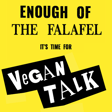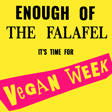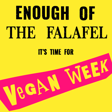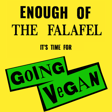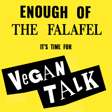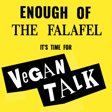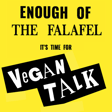
185- Don't worry: Prince William will save the 500,000 Korean dogs...
In a week where Prince William has been slammed by PETA for allowing his dog to breed, and where South Korean farmers continue to find difficulty to rehome the half a million dogs they'll soon be punished for owning, Mark comes up with the perfect solution.!
Also in this episode, Kate, Mark & Ant look at seven other snippets from the last 7 days that are from the animal rights / vegan space.
****************
Enough of the Falafel is a community of people who love keeping on top of the latest news in the world of veganism & animal rights. With the Vegan Week podcast, we aim to keep listeners (& ourselves) informed & up-to-date with the latest developments that affect vegans & non-human animals; giving insight, whilst staying balanced; remaining true to our vegan ethics, whilst constantly seeking to grow & develop.
Each week we look through news stories from the past 7 days in the world of veganism & animal rights.
If you spot any news stories that might catch our fancy, or have an idea for a discussion topic, get in touch via enoughofthefalafel@gmail.com.
******************
This week's stories:
https://plantbasednews.org/culture/the-vegan-society-exhibition-veganism/
https://vegoutmag.com/news/nat-how-many-people-are-going-plant-based-in-2025-heres-what-the-data-says/
https://www.theanimalreader.com/2025/06/17/uk-trade-deal-with-gulf-states-could-lower-animal-welfare-standards/
https://www.farminguk.com/news/britain-loses-nearly-200-dairy-farms-in-past-year-alone_66796.html
https://www.dailyecho.co.uk/news/25261042.salmon-facing-difficulty-reaching-sea-river-itchen/
https://www.theanimalreader.com/2025/06/25/iceland-will-not-kill-whales-in-2025/
https://www.dailymail.co.uk/news/article-14850343/Peta-reaction-William-Kate-allowed-dog-puppies.html
https://www.thejournal.ie/farmers-back-eu-commission-proposal-that-would-ban-vegetarian-products-using-terms-like-burger-6743871-Jun2025/
https://www.bbc.co.uk/news/articles/c20r7lkel68o
****************
Thanks everyone for listening; give us a rating and drop us a message to say "hi"; it'll make our day!
Kate, Mark & Ant
